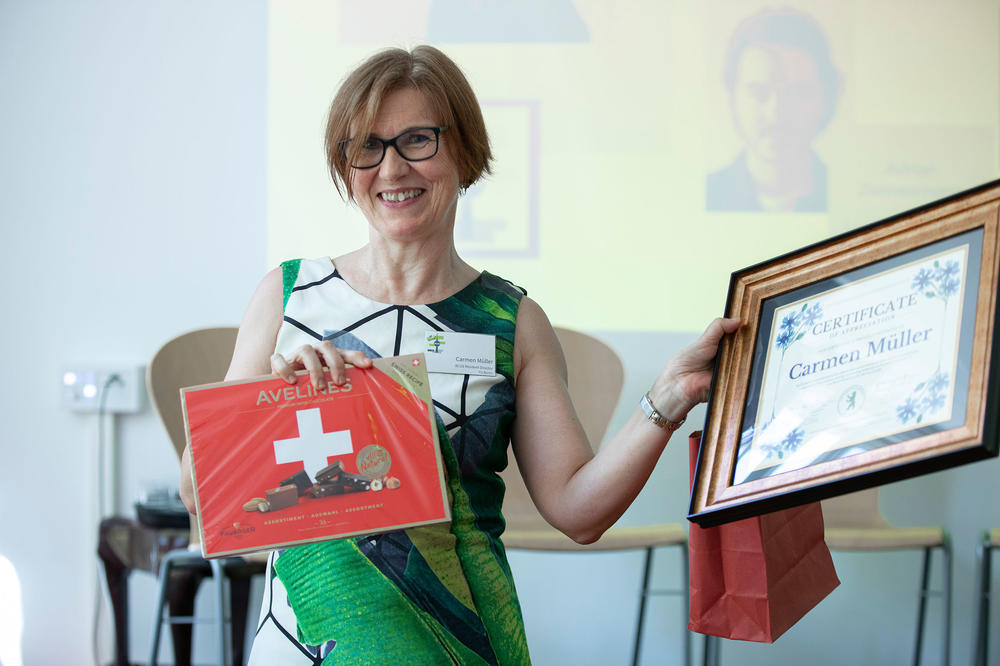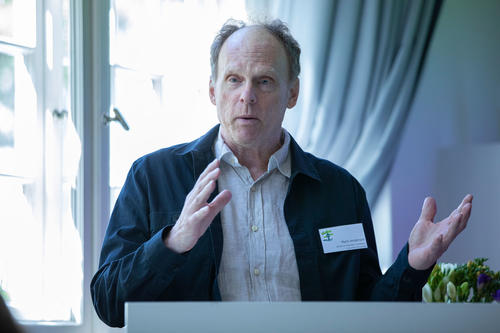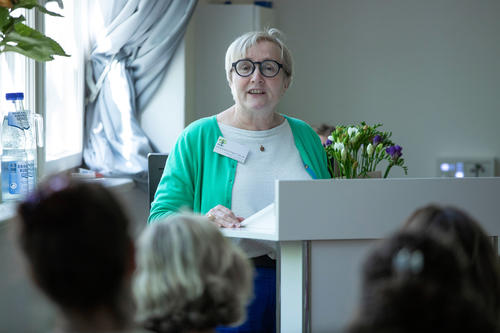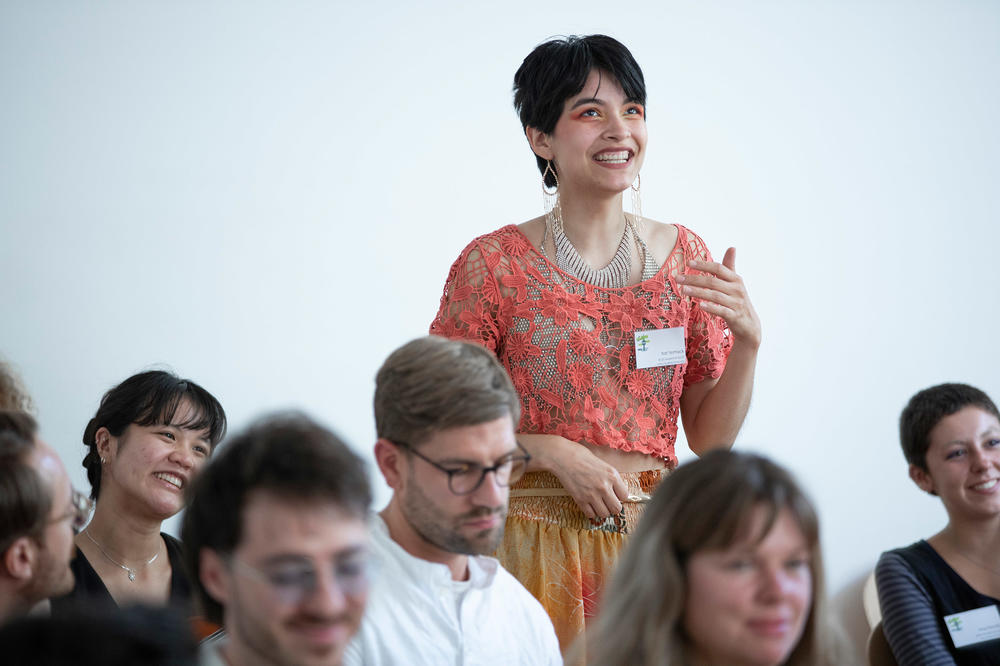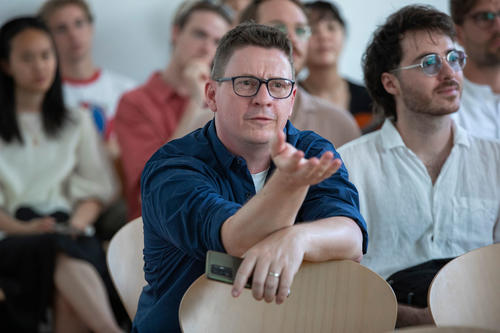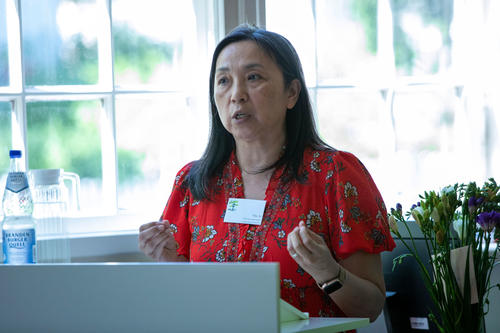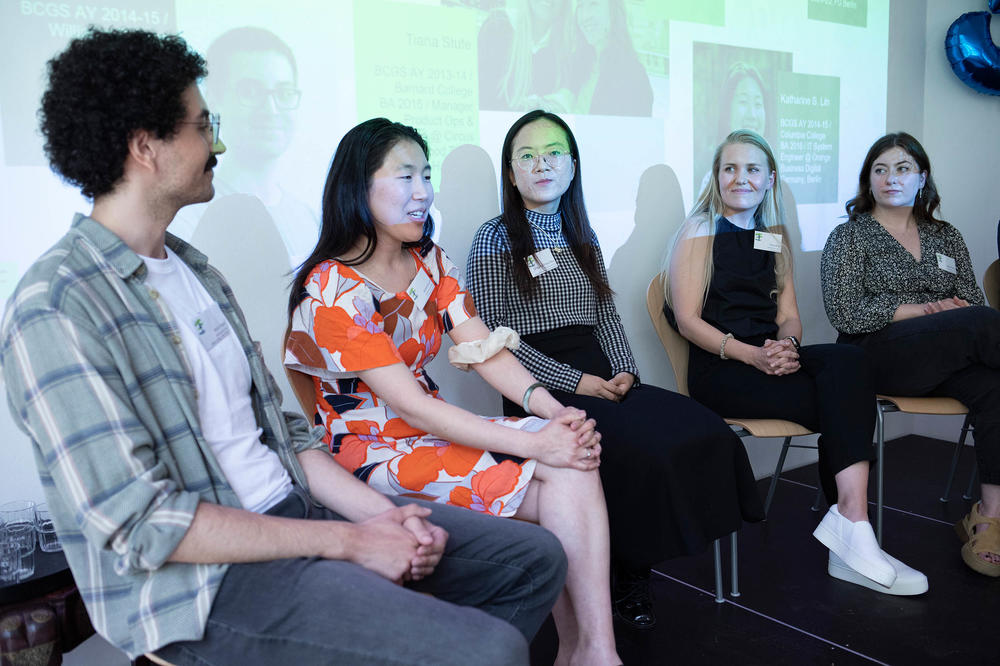“Many people consider Berlin to be their second home after the exchange”
The Berlin Consortium for German Studies (BCGS), which facilitates exchanges between Freie Universität Berlin and six Ivy League universities in the United States, is celebrating its thirtieth anniversary
Jul 30, 2025
Carmen Müller accepts a certificate of appreciation from Columbia University and a box of Swiss chocolates. She has led the Berlin Consortium for German Studies for the last thirty years.
Image Credit: Christian Demarco
Over one thousand students from Germany, the USA, and other countries have participated in the Berlin Consortium for German Studies (BCGS) exchange program over the last thirty years. Considering the challenging times we live in and the strain transatlantic relations are under, this program undoubtedly plays an important role in keeping our lines of communication open and promoting academic freedom.
The 1990s are seen by many to have been an extraordinary period in Berlin’s history. The Iron Curtain had fallen, and an era of hope and new possibilities lay ahead. The now commonplace impression of Berlin as a global metropolis was yet to emerge. “Back then Berlin wasn’t the magnet for tourists and artists that it is today,” says Mark M. Anderson, professor of German studies at Columbia University in New York. “It was a wounded city, pocked with the scars from the twentieth century that were suddenly becoming visible after decades of remaining concealed.”
Mark Anderson, professor at Columbia University, is co-founder of the BCGS.
Image Credit: Christian Demarco
Anderson was captivated by what he experienced on his walks throughout the city. Almost every building seemed to have a story to tell. “To some extent history in Berlin told itself,” he says. “And that’s when I knew that I wanted to give my students the opportunity to get to know Germany up close.”
When a colleague from the German Academic Exchange Service (DAAD) indicated that the organization would be willing to support an exchange program, Anderson did not waste any time in getting one up and running. Thanks to his efforts, the Berlin Consortium for German Studies (BCGS) was founded in 1995. His efforts resulted in a German-American exchange program between Freie Universität Berlin and six of the most prestigious universities in the United States: University of Chicago, Columbia University, Cornell University, Johns Hopkins University, University of Pennsylvania, and Princeton University.
Professor Verena Blechinger-Talcott, Executive Vice President of Freie Universität Berlin.
Image Credit: Christian Demarco
Promoting Understanding on Both Sides of the Atlantic
The BCGS celebrates its thirtieth anniversary this year. To date, 910 international students from the United States and other countries have come to Freie Universität Berlin for a semester or an entire academic year via the program, while over 200 students from Freie Universität Berlin have headed to the United States. Professor Verena Blechinger-Talcott, Executive Vice President of Freie Universität Berlin, notes that it has been a remarkable success story: “The students that come to us through the program not only strengthen their language skills and academic knowledge, but also gain valuable personal and cultural experiences,” she said. “Many of them then return to Germany and become diplomats, academics, artists, or writers and thus continue to promote understanding on both sides of the Atlantic.”
Student Nat Yermack from the United States has made Berlin home for the academic year.
Image Credit: Christian Demarco
The program is open to students from all disciplines. In addition to a comprehensive academic curriculum, students also get to immerse themselves in German culture. “The students that come over participate in a six-week intensive language and culture course when they first arrive,” says Carmen Müller, who has headed the BCGS at Freie Universität Berlin since its foundation. “The schedule allows them to take part in courses held in German and fully settle into life in Berlin, whether they end up in host families or shared flats where German is spoken or choose to do an internship here.”
A member of the team in the audience: Nikolaj Blocksdorf, assistant administrative director.
Image Credit: Christian Demarco
Gaining New Perspectives
Freie Universität Berlin will receive over twenty students from its American partner universities this year. In contrast only ten students from Berlin will go on exchange to the United States. “We are confident that the exchanges will work out, despite the tightened entry requirements to the US,” says Blechinger-Talcott.
The current political situation in the United States in which academic freedom and transatlantic relations are being put under severe strain was also addressed at the BCGS anniversary celebration. “Academic exchange is one of the best ways to promote trust, dialogue, and understanding,” says Müller. “Perhaps the BCGS is more important now than it has ever been in its history.”
Visiting from the United States: Fay Ju, UGE Associate Dean at Columbia University.
Image Credit: Christian Demarco
Support for the program is also strong on the American side. Cofounder Professor Anderson as well as Fay Ju, Associate Dean at the Center for Undergraduate Global Engagement (UGE) at Columbia University, both traveled to Berlin especially for the anniversary celebrations. “We are certain that the close relationship between Columbia University and Freie Universität Berlin will continue to grow exponentially,” she said. “We hope that we will be able to further expand the BCGS in the future and improve it through innovation.”
Anderson also stressed just how invaluable exchange programs are: “Sometimes people in New York think that they don’t need to go abroad, seeing as they have the entire world on their doorstep. But I think that is something fundamentally different to the humility you gain by removing yourself from everything you know and navigating through a language that you may just have started learning.”
Panel discussion with BCGS alumni: Metin A. Turgut, Katharine S. Lin, Qingyang Freya Zhou, Naomi R. Marne, and Tiana Stute.
Image Credit: Christian Demarco
“Ich hab’ noch einen Koffer in Berlin”
Eight alumni of the program attended the anniversary celebration. Today, most of them live or spend a great deal of their time in Berlin. One of them is Naomi Marne, who studied German studies at Barnard College in New York and completed the BCGS program between 2013 and 2014. She found a job immediately afterwards at the film production company UFA, where she worked on the international hit television series Deutschland 83 and its sequels for several years. “I didn’t just gain a second home through the program,” she says. “I also took a series of incredibly important steps in my career.”
Now that this year’s exchange students from the US have landed in Berlin, they are curious to find out from the alumni how the city has changed since they studied here. The discussion quickly shifts to a discussion on one of the key topics dominating the headlines in recent years: sky-rocketing rents. “But there have definitely also been some positive developments,” says Qinyang Freya Zhou, who completed the BCGS program in 2018 and returned in 2024 to participate in the Berlin Program for Advanced German and European Studies at Freie Universität Berlin. “The city is now more open and international. Freie Universität Berlin, too, has been making major progress. There are more courses than ever before that focus on diversity and plenty of projects that center on sustainability.”
The original German version of this article appeared in campus.leben, the online magazine published by Freie Universität Berlin.

